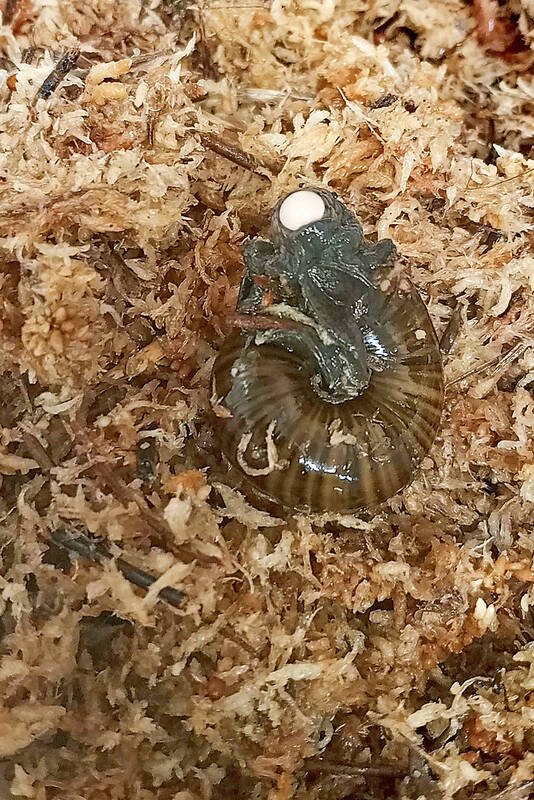The strange reproductive habits of a large, carnivorous New Zealand snail were once shrouded in mystery, but footage of the snail laying an egg from its neck has been captured for the first time, the country’s conservation agency said yesterday.
What looks like a tiny hen’s egg is seen emerging from an opening below the head of the Powelliphanta augusta snail, a threatened species endemic to New Zealand.
The video was taken at a facility on the South Island’s West Coast, where conservation rangers attempting to save the species from extinction have cared for a population of the snails in chilled containers for nearly two decades.

Photo: Lisa Flanagan, New Zealand Department of Conservation via AP
The conditions in the containers mimic the alpine weather in their only former habitat — a remote mountain they were named for, on the West Coast of the South Island, that has been engulfed by mining.
New Zealand Department of Conservation ranger Lisa Flanagan, who has worked with the creatures for 12 years, said the species still holds surprises.
“It’s remarkable that in all the time we’ve spent caring for the snails, this is the first time we’ve seen one lay an egg,” she said in a statement.
Like other snails, P augusta are hermaphrodites, which explains how the creatures can reproduce when encased in a hard shell. The invertebrate uses a genital pore on the right side of its body, just below the head, to simultaneously exchange sperm with another snail, which is stored until each creates an egg.
Each snail takes eight years to reach sexual maturity, after which it lays about five eggs a year. The egg can take more than a year to hatch.

‘TERRORIST ATTACK’: The convoy of Brigadier General Hamdi Shukri resulted in the ‘martyrdom of five of our armed forces,’ the Presidential Leadership Council said A blast targeting the convoy of a Saudi Arabian-backed armed group killed five in Yemen’s southern city of Aden and injured the commander of the government-allied unit, officials said on Wednesday. “The treacherous terrorist attack targeting the convoy of Brigadier General Hamdi Shukri, commander of the Second Giants Brigade, resulted in the martyrdom of five of our armed forces heroes and the injury of three others,” Yemen’s Saudi Arabia-backed Presidential Leadership Council said in a statement published by Yemeni news agency Saba. A security source told reporters that a car bomb on the side of the road in the Ja’awla area in

‘SHOCK TACTIC’: The dismissal of Yang mirrors past cases such as Jang Song-thaek, Kim’s uncle, who was executed after being accused of plotting to overthrow his nephew North Korean leader Kim Jong-un has fired his vice premier, compared him to a goat and railed against “incompetent” officials, state media reported yesterday, in a rare and very public broadside against apparatchiks at the opening of a critical factory. Vice Premier Yang Sung-ho was sacked “on the spot,” the state-run Korean Central News Agency said, in a speech in which Kim attacked “irresponsible, rude and incompetent leading officials.” “Please, comrade vice premier, resign by yourself when you can do it on your own before it is too late,” Kim reportedly said. “He is ineligible for an important duty. Put simply, it was

SCAM CLAMPDOWN: About 130 South Korean scam suspects have been sent home since October last year, and 60 more are still waiting for repatriation Dozens of South Koreans allegedly involved in online scams in Cambodia were yesterday returned to South Korea to face investigations in what was the largest group repatriation of Korean criminal suspects from abroad. The 73 South Korean suspects allegedly scammed fellow Koreans out of 48.6 billion won (US$33 million), South Korea said. Upon arrival in South Korea’s Incheon International Airport aboard a chartered plane, the suspects — 65 men and eight women — were sent to police stations. Local TV footage showed the suspects, in handcuffs and wearing masks, being escorted by police officers and boarding buses. They were among about 260 South

Syrian President Ahmed al-Sharaa on Sunday announced a deal with the chief of Kurdish-led forces that includes a ceasefire, after government troops advanced across Kurdish-held areas of the country’s north and east. Syrian Kurdish leader Mazloum Abdi said he had agreed to the deal to avoid a broader war. He made the decision after deadly clashes in the Syrian city of Raqa on Sunday between Kurdish-led forces and local fighters loyal to Damascus, and fighting this month between the Kurds and government forces. The agreement would also see the Kurdish administration and forces integrate into the state after months of stalled negotiations on